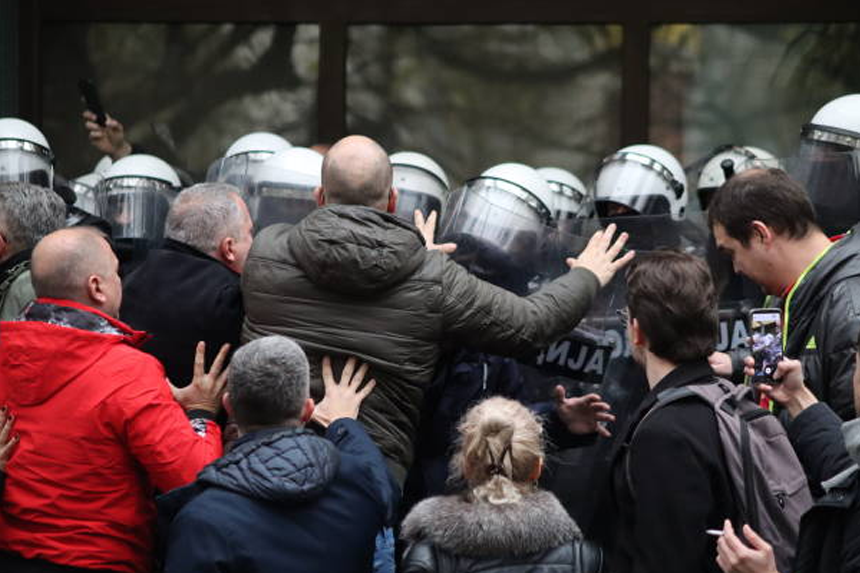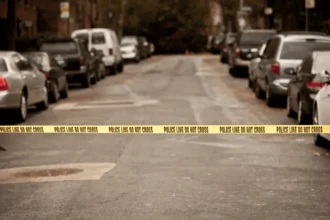Arrests have started following three weeks of demonstrations seeking justice for the fatal collapse of a section of a railway station in Novi Sad, Serbia’s second-largest city. Eleven people have been ordered to be questioned by local prosecutors about the accident at the recently rebuilt station.
- Why Are Protests in Novi Sad Gaining Momentum?
- Who Are the Government Officials Arrested in Connection with the Disaster?
- What comments on the disaster were made by President Vucic?
- How Are Opponents Reacting to the Tragedy?
- Why Do Protesters Demand More Than Only Arrests?
- Can the judicial process rebuild public confidence?
At the start of the month, a concrete and glass canopy collapsed on fifteen persons, sadly killing them. Novi Sad has been in a state of grief after the occurrence; its people have expressed wrath over the circumstances leading to the fatal fall-off. Public anger only becomes more vital as more specifics of the incident become known.
Why Are Protests in Novi Sad Gaining Momentum?
Over 20,000 people have joined the historic Novi Sad marches, among the biggest ones the city has witnessed in decades. The catchphrase “corruption kills” has become a rallying cry for the demonstrators, who assert that opaque government procurement policies for infrastructure projects have led to dangerous building methods, benefiting a few chosen contractors at the price of public safety.
Tear Gas Fired as Madagascar Protests Escalate
Angry protestors have insisted that the catastrophe is directly the result of the government’s lack of openness and responsibility for contract award decisions. One demonstrator declared, “We are demanding justice,” “and we will not stop until those responsible for this disaster are held accountable.”
Who Are the Government Officials Arrested in Connection with the Disaster?
Among the people arrested in the catastrophe is Goran Vesic, former Serbian building minister. Vesic fiercely denies any responsibility for the killings, even though he resigned in the days following the fall. “I cannot accept guilt for the deaths,” Vesic stated, announcing his resignation. “Because I, and the people who work with me, have no trace of responsibility for the tragedy.”
Prosecutors seem to see things differently, even with his resignation; inquiries now center on “criminal acts against public safety.”
Nonetheless, Vesic insisted that he was working with the police and presented himself as a ready witness instead of a suspect. “I freely answered the call of police officers with whom I came to Novi Sad and made myself available to the investigative authorities,” he said on social media.
What comments on the disaster were made by President Vucic?
Following a broadcast speech by Serbian President Aleksandar Vucic warning those accountable for the catastrophe of consequences, the arrests followed. Vucic remarked, realizing the seriousness of the matter, “Fifteen people did not die because of their fault, but because someone did not do their job properly.”
Vucic, however, is in a difficult political position since he is intimately linked to the Novi Sad railway station project. A significant part of the government’s well-publicized infrastructure project, which comprises the high-speed train route from Belgrade to Budapest, is the station. With Hungarian prime minister Viktor Orban, Vucic opened the rebuilt station in 2022.
“This is our way of modern Europe — our way to a better, progressive Serbia,” Vucic said during the opening ceremony.
The station was rebuilt following the official opening, even with the inauguration; another ceremony occurred this summer. However, the recent tragedy at the station clouds the government’s infrastructure aspirations by drawing attention to possible safety shortcomings.
How Are Opponents Reacting to the Tragedy?
The fall of the canopy has come to represent public dissatisfaction with the government, and Serbia’s opposition parties have been fast to target President Vucic and his Progressive Party. They contend that the catastrophe results from a culture of nepotism and lawlessness, charging the administration with putting political ties above public safety and welfare.
“The slogan of the people is that we are all below this canopy that’s called Serbia — it can collapse anywhere you are,” said Biljana Djordjevic, co-leader of the Green-Left Front, one of the opposition groups driving the push against the government.
Djordejevic said, “The Progressive Party relies its power on the argument that they are building the country and that this enhances living standards. People’s policy is considered flawed if they feel dangerous about this nowadays.
Why Do Protesters Demand More Than Only Arrests?
After the arrests, the demonstrations—which demand the resignations of essential government officials like Milan Djuric, the present mayor, and former Novi Sad mayor Prime Minister Milos Vucevic—are unlikely to stop. Both authorities are under investigation as public resentment over the lack of responsibility surrounding the catastrophe keeps rising.
Another demonstrator said, “The people are calling for actual change. We want a government that prioritizes openness and safety above one based on corruption and neglect.”
Can the judicial process rebuild public confidence?
Restoring public trust becomes increasingly difficult for the government as the inquiry continues. If the court system provides reliable and expeditious responses, it could help ease the mounting throngs. However, if the government fails to establish clear responsibility, the demonstrations could intensify, further aggravating a fragile political environment.
For now, Serbia’s officials are treading carefully as popular indignation and international attention grow over the sad events at Novi Sad’s railway station. The government’s reaction to the calamity will greatly shape the nation’s future political environment.








